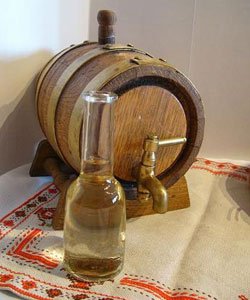

© Photo: Lyudmila Savova
In times of crisis a number of Bulgarians are concerned with prices and wonder which type of rakia is cheaper. The homemade, of course. Production of rakia at home is a part of the Bulgarian culture in a number of regions. The tradition is attractive to foreigners, too. Two years ago the retired English policeman Michael Weavers, who now lives in the Bulgarian village of General Toshevo won the local rakia competition. The locals now call him with respect Bai Michael.
It is known that monks from the monasteries near the town of Troyan in Central Bulgaria are masters of the plum rakia, which is prepared according to a recipe from the 19th century. At least 12 different types of herbs are used but special varieties include 33 herbs. In the monasteries the rakia is stored in oak casks. Before pouring the rakia into bottles, it is blessed in front of an icon of St. George.  Vassil Mandzhukov from the village of Oreshak told us more about the tradition of rakia production. “You should only drink rakia that has aged for 12 years,” he claims. “When we make rakia, we keep it in an oak cask for 6 months, before pouring into glass bottles and burying them in the ground,” he explains and adds: “Aged rakia has different qualities and that is why my father diet at 95.”
Vassil Mandzhukov from the village of Oreshak told us more about the tradition of rakia production. “You should only drink rakia that has aged for 12 years,” he claims. “When we make rakia, we keep it in an oak cask for 6 months, before pouring into glass bottles and burying them in the ground,” he explains and adds: “Aged rakia has different qualities and that is why my father diet at 95.”
English: Alexander Markov
In Bulgaria, 71 per cent of 15-year-olds expect to graduate from university and 45 per cent expect to have a managerial or professional position by the time they are 30. Both expectations are below the survey average compared to other countries..
Exactly in one month - on May 26th at 11:00 am in the capital of Denmark - Copenhagen, the 10th anniversary edition of "The Biggest Bulgarian Horo" will take place. The event is organised by the folk dance group "Dilmana". The event will once again..
Citizens of North Macedonia elect president on May 8 With 40.08% in comparison to 19.92% of those who voted in the first round of the presidential elections in North Macedonia, VMRO-DPMNE candidate Gordana Siljanovska..
Bulgarian folk dances from the Pirin region and all folklore areas will be performed on 26 and 27 April at the White Stage Event Complex in the mountain..
Citizens of North Macedonia elect president on May 8 With 40.08% in comparison to 19.92% of those who voted in the first..
Exactly in one month - on May 26th at 11:00 am in the capital of Denmark - Copenhagen, the 10th anniversary edition of "The Biggest Bulgarian Horo" will..

+359 2 9336 661
